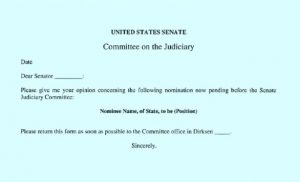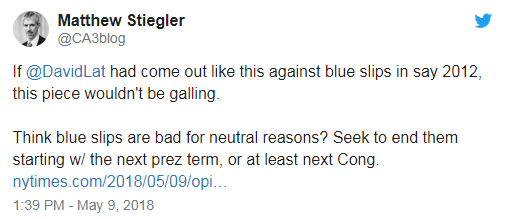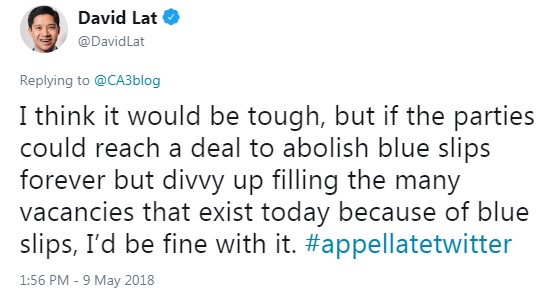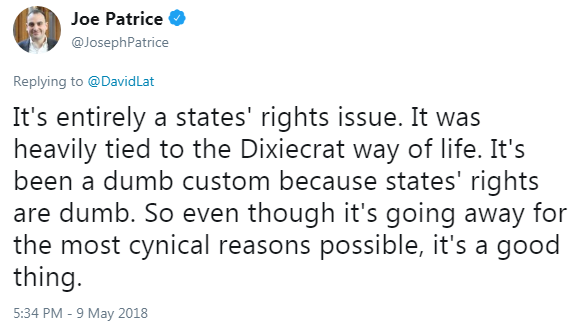
A blue slip (Senate Judiciary Committee via Alliance for Justice).
Last week witnessed a noteworthy passing. Blue slips, rest in peace.
Blue slips have been part of the federal judicial nominations process for more than a century, but the importance they deserve in that process has been the subject of vigorous debate. Here’s some background on blue slips from a New York Times op-ed I wrote about them last week:

The Law Firm’s Guide To Trust Accounting And Three-Way Reconciliation
Proper trust accounting and three-way reconciliation are essential for protecting client funds and avoiding serious compliance risks. In this guide, we break down these critical processes and show how legal-specific software can help your firm stay accurate, efficient, and audit-ready.
On Wednesday morning, the Senate Judiciary Committee is holding a confirmation hearing for Ryan Bounds, a federal prosecutor who has been nominated to the influential United States Court of Appeals for the Ninth Circuit, in San Francisco. The hearing is taking place despite the refusal of his home-state Democratic senators, Ron Wyden and Jeff Merkley of Oregon, to return their “blue slips” — blue pieces of paper that senators use to indicate their favorable or unfavorable opinion of a nominee from their state. [Ed. note: As I’ve mentioned before in these pages, and I mention elsewhere in the Times piece, Bounds is a friend of mine from law school.]
Blue slips are not provided for in the Constitution or by statute; they are merely a Senate tradition, and the importance given to them has varied over the years. But this latest shift in blue-slip practice has generated loud opposition, especially from the left, because in recent history — and during the entire Obama administration — no hearing or vote was held on a nominee unless both home-state senators had returned their blue slips.
The Bounds hearing wasn’t the only bad news for blue slips from last week. Last Thursday, the Senate confirmed Michael Brennan to the Seventh Circuit by a vote of 49-46, even though one of his home-state senators, Senator Tammy Baldwin (D-Wis.), refused to return her blue slip.
Although not the focus of my op-ed, the historical variation in treatment of blue slips merits notice. As noted in this Washington Post piece, it’s incorrect of Senator Dianne Feinstein (D-Calif.) and other Democrats to claim that Republicans are destroying a “century-old tradition” of giving a single senator, through the blue slip, effective veto power over nominees from her home state. For a majority of the 100 or so years that blue slips have been around, including periods when the Senate Judiciary Committee was led by Democrats like Joe Biden and Ted Kennedy, blue slips have not been given this kind of power and importance.
And it’s a good thing too, as I argue in the Times:
Many people have bemoaned the demise of the filibuster and now the blue slip. It certainly reflects a decline in senatorial courtesy. It’s bad news for individual senators, who now have less power to scuttle nominations.
But the effect that scrapping blue slips will have upon the federal judiciary, and therefore the nation, is actually positive.
The federal bench has a high number of vacancies. In January 2017, the start of President Trump’s term, there were 106 vacancies in the life-tenured federal judiciary. Today there are 174 current and known future vacancies, although 33 of Mr. Trump’s judicial nominees have been confirmed. Of these vacancies, 72 have been declared judicial emergencies by the Judicial Conference, based on how long they have been open and the heavy caseloads in their courts.
Vacancies are a serious problem. Imagine any institution — a sports team, a legislature, a university faculty — trying to operate with almost 20 percent of its members missing. According to the Federal Bar Association, “The rising number of judicial vacancies prevents the prompt and timely administration of justice in the federal courts.” Delays in case resolution are most keenly felt by the less privileged, including criminal defendants languishing in jail and civil plaintiffs who cannot recover damages for injuries.
And much of the blame for the many vacancies belongs to blue slips:
Republican senators abused [blue slips] to prevent President Barack Obama from filling judgeships — keeping some seats open for years, presumably so they could be inherited by a Republican president to fill. Now Democrats are abusing blue slips, blocking Mr. Trump from filling the 100-plus vacancies he inherited and the dozens of new vacancies since then.
Partisans might argue that it is better to let a judgeship sit vacant, even for years, than to have it filled by a president from the other party. But this misunderstands the work of the federal courts.
As any federal judge or law clerk can tell you, the vast majority of cases heard by federal courts are not political. While important to the litigants, these garden-variety cases involve the straightforward application of settled law, and they would come out the same way regardless of the judge’s political views. Hot-button cases in the news are the exception, not the rule. Even the Supreme Court — which picks the few cases that it hears, and therefore has an especially politicized docket — decides about two-thirds of its cases by unanimous vote.
As a practical matter, it’s much less important to have a judge appointed by a Republican or a Democrat than it is to have a judge appointed, period — confirmed and hearing cases as soon as possible. A judge’s politics will make a difference in only a tiny fraction of cases, but her presence on the bench will make a huge difference in terms of resolving cases expeditiously.
So I don’t buy the partisan defense — this time from Democrats, previously from Republicans — of blue slips. But I do think this point, tweeted at me by Matthew Stiegler of the (excellent) CA3blog, is fair:
Put another way, is it fair for President Trump and Senate Republicans to reap a windfall of judicial appointments by scrapping blue slips now — especially when many of the vacancies they’re now filling were of their own making, by abusing blue slips (and also the filibuster) to block President Obama’s judicial nominees?
This does raise serious fairness concerns. I think this would be a more equitable approach, as I tweeted in response to Stiegler:
Of course, the partisanship and dysfunction that killed both the filibuster and now blue slips would probably also preclude any sort of “grand bargain” on judicial nominations.
Democrats will have to exact their revenge by winning future elections — which I predict that they will, even if we don’t yet know which ones. And when they do, they will enjoy the power over judicial vacancies that the Republicans currently possess:
In the short term, with filibusters and now blue slips effectively gone (at least for appellate nominees), President Trump will enjoy a greater ability to appoint judges than his predecessors, which might not sit well with his opponents. But going forward, presidents of both parties will benefit from this power — and so will the federal judiciary, which will operate at or near capacity for longer.
Both parties wanted filibusters and blue slips gone for political reasons. But their removal will actually reduce gamesmanship in nominations. The cynical practice of a senator using these tools to block or stall nominees will be much more difficult. Instead, vacancies will be filled on more of a rolling basis, not just in partisan spurts when a single party controls the White House and Senate.
So, let’s cheer the effective end of blue slips for judicial nominees. Today, their absence will benefit Republicans; tomorrow, their absence will benefit Democrats. But over the long run, the true winner will be the federal judiciary — and all of us.
The Times kept me to a word count — but I’m not so constrained here in the pages of Above the Law, so I’ll address a few more issues and concerns.
The defense of blue slips most frequently presented to me is that they give home-state senators an important and necessary voice in selecting judges from their states. I have a few responses.
First, recall that circuit judges are regional rather than state-based officials, so their rulings affect multiple states — all the states within their respective circuits, not just the state they happen to live in. So when senators use blue slips to stop qualified nominees from going forward, those actions — and the resulting unfilled vacancies and case delays — affect multiple states and their citizens.
Second, remember that blue slips continue to be honored — i.e., treated as conferring veto power — when it comes to district judges, whose influence is (generally) limited to the state in which each sits. This gives home-state senators some leverage when negotiating with the White House, even if the White House takes all or most of the circuit slots for itself. For examples of this at work, see the recent slates of Hawaii and Illinois judicial nominations, where Democratic senators and the Trump Administration managed to put together deals with bipartisan support.
(But to play devil’s advocate, should we perhaps get rid of blue slips for district judges too? In a day and age of nationwide injunctions, the rulings of district judges can have nationwide reach, affecting the rights and obligations of people thousands of miles away.)
Third, it’s not clear to me that there’s much “home-state insight” into what makes a good circuit judge. Contrary to my colleague Joe Patrice, who tweeted that scrapping blue slips amounts to “the Federalist Society decid[ing] federalism was inconvenient,” I don’t see this as a federalism issue. Federalism focuses on the division of power between federal and state governments, and the blue-slip debate is about the division of power between various federal officials (the president, home-state senators, and the Senate as a whole).
Furthermore, Joe makes this excellent point about “home-state insight” and the institution of blue slips:
He’s referring here to the ugly history of Southern senators using blue slips to block judges from their states who supported civil rights — another point in favor of abolishing blue slips.
Fourth, in response to the slippery-slope argument of “this will lead to a total nationalization of the judicial process, with no such thing as circuit seats tied to specific states” — an argument raised at the Bounds hearing by Senator Whitehouse (D-R.I.) — remember that, by statute (28 U.S. Code § 44), each state gets at least one circuit judge.
Fifth and finally, remember that nominees must still win approval from the Senate as a whole — and that opposition to a nominee from her home-state senator could certainly cause colleagues to vote against that nominee. So I don’t share Professor Carl Tobias’s fear that scrapping blue slips gives the president the power to willy-nilly “stuff [nominees] down [senators’] throats.”
(Professor Tobias also observes that tossing blue slips weakens the Senate as an institution — or, at the very least, weakens the power of individual senators. That’s true, but remember: that when it comes to the demise of both the filibuster and now blue slips, the Senate did this to itself.)
Here’s a different, quite interesting argument raised against my position: could the demise of blue slips lead to a more polarized judiciary, the exact opposite of what I predict in my piece? As what one correspondent wrote me:
I’m much more pessimistic than you are about the direction things are heading. Far from this process of escalation leading to “vacancies [being filled] on more of a rolling basis,” I suspect this will all deepen a new status quo in which vacancies are only filled when the Senate and White House are filled by the same party. With no need to moderate appointments on the basis of blue slips, the White House can (and will) appoint outliers more easily. That will lead to a backlash from opposing Democrats or Republicans on the receiving end of the nominations, who will cry bad faith and refuse to vote on any nominations when they retake the Senate as a matter of principle, or engage in the same tactic when they retake both the Senate and White House. Add into this the new possibility (indeed, pattern) of presidential attacks on judges, and it seems only a matter of time until something boils over altogether.
This is certainly a possibility. My argument of reduced partisanship in an age without blue slips assumes something that has been true for most of recent history, but is (sadly) becoming less true today: if the president’s nominee is qualified and reasonable, she gets confirmed, even if she’s not necessarily who the Senate or individual senators might have picked. This is why qualified, mainstream judges have, at least in the past, generally cleared the Senate by healthy margins, regardless of who controls the White House and who controls the Senate (as long as they didn’t get filibustered or blue-slipped).
But sadly, in these polarized times, highly qualified and reasonable judges are now squeaking by with party-line votes. So I concede that my assumption might not hold going forward.
It’s hard to predict, however, which way the partisanship winds will blow. A different reader offers this observation about how blue-slip abuse exacerbates partisanship and reduces moderation:
Great piece in the NYT today – the country would be better off if both sides put down their swords on blue slips. My big concern about the abuse of blue slips in recent years is how it affects the partisan composition of the various courts of appeals. If home state senators get a veto, it is very hard for a Republican president to put judges on the Ninth Circuit and very hard for a Democratic president to put judges on the Fifth Circuit. The result is more and more perceived daylight between “liberal” and “conservative” appellate courts, which is terrible for the rule of law.
Agreed. So blue slips, rest in peace — and please don’t rise from the dead to stalk the federal judiciary ever again.
Good Riddance to ‘Blue Slips’ [New York Times]
Milwaukee lawyer Michael Brennan confirmed for U.S. Court of Appeals [Milwaukee Journal Sentinel]
 David Lat is editor at large and founding editor of Above the Law, as well as the author of Supreme Ambitions: A Novel. He previously worked as a federal prosecutor in Newark, New Jersey; a litigation associate at Wachtell, Lipton, Rosen & Katz; and a law clerk to Judge Diarmuid F. O’Scannlain of the U.S. Court of Appeals for the Ninth Circuit. You can connect with David on Twitter (@DavidLat), LinkedIn, and Facebook, and you can reach him by email at [email protected].
David Lat is editor at large and founding editor of Above the Law, as well as the author of Supreme Ambitions: A Novel. He previously worked as a federal prosecutor in Newark, New Jersey; a litigation associate at Wachtell, Lipton, Rosen & Katz; and a law clerk to Judge Diarmuid F. O’Scannlain of the U.S. Court of Appeals for the Ninth Circuit. You can connect with David on Twitter (@DavidLat), LinkedIn, and Facebook, and you can reach him by email at [email protected].



